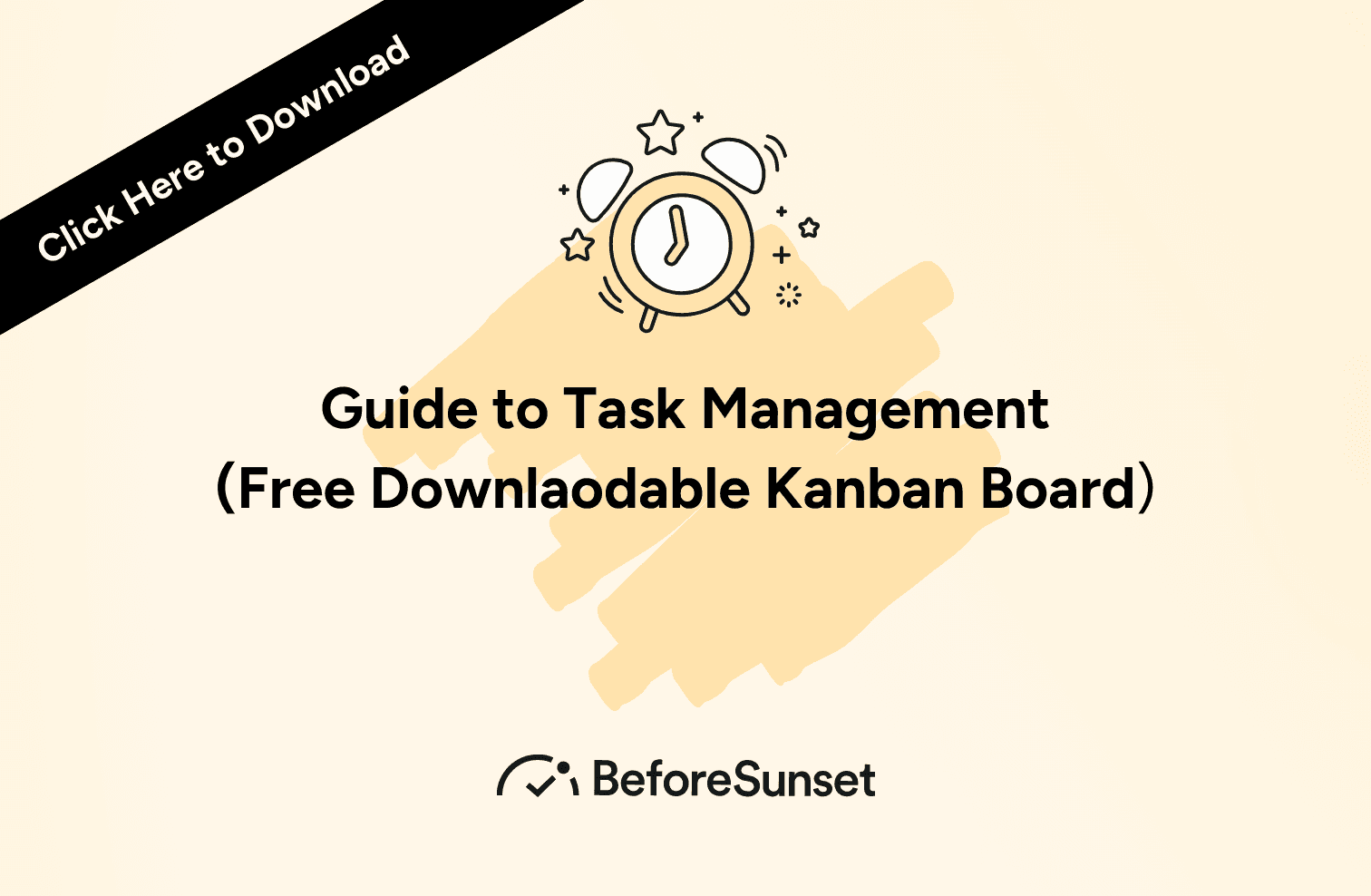Welcome to The Ultimate Guide to Task Management: How to Organize Your Tasks and Manage Your Work! In today's fast-paced world, it can be overwhelming to keep track of everything you need to do. Whether you're a student, a professional, or a business owner, you likely have a long list of tasks that need to be completed in order to reach your goals. That's where task management comes in.
In this guide, we'll cover the basics of task management and provide tips and strategies for staying organized and on top of your work. We'll also discuss the tools and techniques you can use to manage your tasks, including to-do lists, calendars, and project management software.
By the end of this guide, you'll have a better understanding of how to manage your tasks and be well on your way to achieving your goals. Let's get started!

What is Task Management?
Task management is the process of organizing and managing your work so that you can be more productive, efficient, and effective. It involves identifying what needs to be done, prioritizing tasks, and creating a plan for completing them.
There are many different approaches to task management, ranging from simple to-do lists to complex project management software. No matter what method you choose, the goal is the same: to help you get things done and achieve your goals.
Why Is Task Management Important?
Task management is important because it helps individuals and organizations be more productive, efficient, and effective. By organizing and prioritizing your tasks, you can work more efficiently and get more done in less time. Task management can also help you reduce stress, improve time management, enhance collaboration, and increase visibility into projects and tasks. By managing your tasks effectively, you can achieve your goals more efficiently and be more successful.
What are the 4 Elements of Task Management?
Identifying tasks:
The first step in task management is identifying what needs to be done. This involves creating a list of tasks and determining their importance and relevance to your goals.
Prioritizing tasks:
Once you have identified your tasks, the next step is to prioritize them based on importance and deadline. This helps you focus on the most important tasks first and avoid getting overwhelmed.

Creating a plan:
After you have identified and prioritized your tasks, the next step is to create a plan for completing them. This might involve creating a schedule, assigning tasks to team members, and allocating resources.
Tracking and reviewing progress:
The final element of task management is tracking and reviewing progress. This involves regularly reviewing your task list and progress to ensure that you are on track and making progress toward your goals. It may also involve adjusting your plan as needed to stay on track.
By following these four elements, you can effectively manage your tasks and achieve your goals.
What are the Advantages of Task Management?
Staying on track and achieving your goals
It is important not to get distracted if you want to be successful. So keeping everything under your control is a must.
Staying productive and focused
Staying productive and focused is the key to getting things done. You might get some help by using tools that can help you manage both your time and work.

Avoid getting overwhelmed
Having a lot of tasks can be overwhelming. But if you know how to manage them by being focused and organized, it’s just a piece of cake.
Increased productivity and efficiency
Working or getting your tasks is not that hard. What’s hard is increasing your productivity and efficiency under all the pressure from your deadlines. Your solution here is task management. Who doesn’t want to know when to start or when to finish and go home to relax all you want?
Getting better at managing your workload
When you have tons of things on your plate it’s hard to decide on which one you’ll eliminate first. But if you plan them ahead it’ll be easier to not only keep track of your responsibilities but also to get them done.
Working more effectively with others
In the workplace, it is important for the whole team to work together in sync. If not there will be negative outcomes. So it is important to manage your tasks not just for yourself but also for the team as it needs to be in sync with them and their schedule.
Increased project visibility and transparency
Increasing project visibility and transparency helps to improve communication and collaboration within the team, enhances accountability, builds trust and confidence, and increases efficiency. By providing visibility into the progress of a project, team members and stakeholders can stay informed and work together more effectively. This can lead to better outcomes and the successful completion of the project.
Improved communication and accountability
Improving communication and accountability is important for the success of any team or organization. Good communication helps to ensure that everyone is on the same page and working towards the same goals. It also helps to prevent misunderstandings and conflicts. Accountability, on the other hand, helps to ensure that team members are taking responsibility for their work and meeting their commitments.

Organizing and prioritizing
By organizing and prioritizing your tasks, you can work more efficiently and avoid wasting time on low-priority tasks. This can free up time for more important tasks and allow you to get more done in less time. In addition, effective task management can help you avoid missed deadlines or last-minute rushes, which can save you money in the form of late fees or other penalties.
The improved project success rate
Managing your tasks is important because it can help to improve the success rate of your projects. In addition, effective task management can help you identify and address any issues or obstacles that may arise during the course of the project. By staying on top of your tasks and keeping your projects organized, you can increase your chances of success and achieve your goals more effectively.
Different Ways of Task Management
Manage tasks by using tools
Team productivity tools, Project planning software, Time tracking software, Project management spreadsheets, Calendar apps, and Task management apps are great tools that can help you manage your tasks with ease. Some of the are Kanban boards, ProjectScrum, Microsoft Project, and of course BeforeSunset.
You can also go for much more simple options like To-Do Lists but these types of approaches only help you manage your tasks not your time. You have to keep track of time if you want to manage them at the same time. However, with time tracking software like Before Sunset you’ll be able to not only manage your tasks but also your valuable time! You’ll finish your work before the deadline and have time for yourself and your family.
Time and task management
There are also some other options that you need to consider. Like using a calendar. You can use a physical calendar, a digital calendar, or a combination of both. A calendar can help you schedule tasks and appointments, as well as keep track of deadlines. It helps you plan your time: By scheduling tasks on your calendar, you can get a sense of how much time you have available and plan accordingly.
It also helps you avoid overcommitting: By seeing all of your tasks and appointments in one place, you can avoid overcommitting yourself and taking on more than you can handle. And lastly, it helps you stay organized: A calendar can help you stay organized by providing a clear view of your schedule and reminding you of upcoming tasks and deadlines.
Project or task management software
You can also consider project management software. Project management software is a tool that helps individuals and teams organize, track, and complete projects. It typically includes features such as task assignment and tracking, project scheduling, resource allocation, and communication tools.
These features can help team members stay on track and collaborate effectively, as well as provide visibility into the project's progress for managers and stakeholders.
Prioritizing is the key
But before all that you need to be sure of what you need to handle first. Meaning knowing what your priorities are. Not all tasks are created equal, so it's important to prioritize them based on importance and urgency. This can help you focus on the most important tasks first and avoid getting bogged down with less important tasks. There are a few different ways to prioritize tasks:
The urgent/important matrix: This is a tool developed by Stephen Covey that helps you prioritize tasks based on their level of urgency and importance. Tasks that are both urgent and important should be your top priority, followed by important but not urgent tasks. Tasks that are neither urgent nor important should be delegated or eliminated if possible.
The Eisenhower matrix: This is another tool for prioritizing tasks based on their level of importance and urgency. Tasks that are both important and urgent should be done immediately, followed by important but not urgent tasks. Tasks that are neither important nor urgent should be delegated or eliminated.
The ABC method: This is a simple method for prioritizing tasks based on their importance. A tasks are the most important and should be done first, followed by B tasks, and then C tasks. You can always try each one out to see which one fits you and your work ethic the most.

What is team task management?
Team task management is the process of organizing and managing tasks within a team or organization. It involves identifying tasks, assigning them to team members, tracking progress, and reviewing and adjusting the plan as needed. Team task management can help teams work more efficiently and effectively by ensuring that everyone is on the same page and working towards the same goals. It can also help to improve communication and collaboration within the team and increase transparency in the progress of tasks and projects. There are a variety of tools and techniques that can be used for team task management, including to-do lists, calendars, and project management software.
How to Set up a Task Management System?
If you have no experience with task management, the good news is that it's easy to get started. Here are some steps you can follow to set up a task management system:
Identify your goals:
Before you can start managing your tasks, it's important to know what you're working towards. Take some time to think about your short-term and long-term goals, and write them down. This will help you prioritize your tasks and stay focused on what's important.
Make a list of your tasks:
Next, make a list of all the tasks you need to complete. These can be small, everyday tasks or larger, long-term projects. Be sure to include deadlines and any necessary details.
Prioritize your tasks:
Once you have a list of tasks, prioritize them based on importance and deadline. This will help you focus on the most important tasks first and avoid getting overwhelmed.
Choose a task management tool:
There are many different tools you can use to manage your tasks, including to-do lists, calendars, and project management software. Choose the tool that works best for you and your workflow.
Create a schedule:
Use your task list and chosen tool to create a schedule for completing your tasks. Be sure to include time for breaks and unexpected interruptions.
Review and adjust your system regularly:
Task management is an ongoing process, so be sure to review and adjust your system as needed. This might involve changing your priorities, updating your schedule, or trying out a new tool.
By following these steps, you can set up a task management system that works for you and helps you stay organized and on top of your work.

The Benefits of Task Management?
Task management is the process of organizing and managing your work so that you can be more productive and effective. The benefits of task management include increased productivity, reduced stress, improved time management, enhanced collaboration, and greater visibility into projects and tasks. By implementing a task management system, you can work more efficiently and achieve your goals more effectively.
Thank you for reading The Ultimate Guide to Task Management: How to Organize and Manage Your Work! We hope that you now have a better understanding of how to organize and manage your work to be more productive, efficient, and effective. Remember, task management is an ongoing process, so be sure to review and adjust your system as needed. With a little planning and organization, you can achieve your goals and succeed in your work. Good luck!


